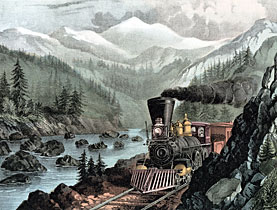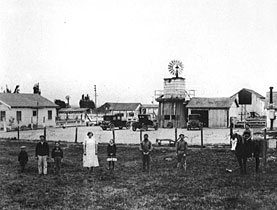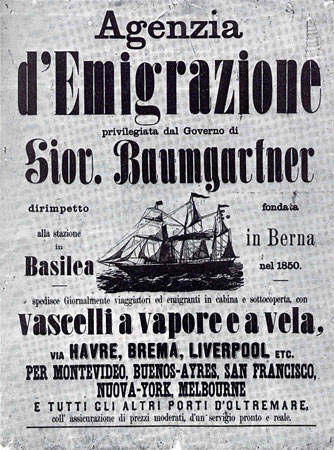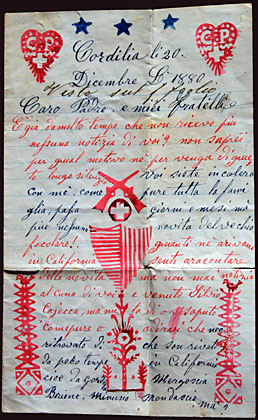“Had I known that California was a wilderness”

What Giorgio Cavalli wrote of his experiences in the United States was not typical of the average Ticinesi.
That is because Cavalli, a native of the Ticino village, Verscio, was a writer by trade as editor of the San Francisco-based, Italian-language newspaper, L’Elvezia.
In this extract from an account published in 1890, Cavalli describes an encounter with a group of immigrants travelling by train to California.
Into the West
I spent the 30 minutes allowed for dinner on board an emigrant train bound for California, which was stationary at Elko (Nevada), alongside the train I was travelling in. At the tail end of this train were three carriages full of what one might call the “superabundance” of the European population. There must have been 160 of them in all: men, women and children of every age and nationality, for the most part uncouth, shabby and dirty, whom the cultured and noble Europe was sending to the wild and uncultivated California to feed themselves and become civilised.
They were divided into groups, not by nationality but by language, so in one section you would have found Prussians, Dutchmen, Austrians and German-speaking Swiss; in another, Italians, Ticinesi and Dalmatians; in another, Scandinavians, Danes and so on. With so many languages being spoken, it was a real tower of Babel. For six days they had been packed into those stinking carriages and had slept fitfully, or pretended to sleep, on the hard benches that served for beds and seating. They had eaten nothing but the few dry provisions they brought with them, and very few of them had washed their faces since the day they left New York.
A group of Ticinesi – I recognised them by their dialect – also tired out from journey, dirty and covered in dust, were quartered in the middle carriage. There were fourteen of them: four women and ten men, or rather lads, as none of them was over 25, except one who acted as leader of this caravan. From his independent air, the poor English with which he larded his speech, and the effortless authority he exercised on the others, I immediately recognised him for what he was: a Ticinese returning to California for the second time; a common-or-garden labourer who, like so many others, after working like a slave and suffering privations and humiliations in America, had returned to his native land with plenty of dollars and even more arrogance. Now, having spent much of the former and laid aside the latter, he was on his way back, maybe pleased to have done some little good to his fellow-countrymen in need, having treated the entire male population of his village like idiots, and refused the position of mayor. Maybe he was triumphant, too, at having hobnobbed with the GREAT-I-AM himself [the conservative politician Gioachimo Respini].
Neither young nor good-looking
The women, I am afraid to say, were neither young nor good-looking. Exhausted by the long journey, dishevelled and dressed in slovenly fashion, their faces were dull and expressionless. The young men had an easy, cheerful manner. Some were making the atmosphere even worse by smoking straw cigars, others were munching bits of dry bread and, with their mouths full, speculating on the results of the 3 March elections in Ticino. One young fellow, of Celtic type from the Val Verzasca, was running his fingers over a worn hurdy-gurdy while day-dreaming, maybe of the mother he had left behind, but more likely of the plump shepherdess with whom, up in the mountains of his native valley, he had danced giddy waltzes and ravishing mazurkas to the sound of the same hurdy-gurdy, never to be forgotten. One of them, a handsome young dandy, dressed with some sense of style, was leaning out of a carriage window, taking pleasure in ogling the young ladies from first-class, who had alighted from my train to have dinner.
I gazed for a moment at that party of fellow-villagers, then spoke up:
“Are you Swiss?”
They were not a little surprised at hearing me speak their dialect and looked at one another questioningly, then the leader replied:
“Yes, and you?”
“So am I. And these young people are emigrants going to California, aren’t they?”
“Yes – said one of the women jumping up, maybe more talkative than her companions – but had I known that California was a wilderness like this, I would never have come.”
“No – replied the elegant young dandy – it was certainly not worth coming to such a godforsaken country. How will I survive here, accustomed as I am to big cities, to the merry life of a commis-voyageur? Moi, J’ai habité Neuchâtel pendant six ans, et j’ai voyagé toute la Suisse par long et par travers comme représentant de la fabrique de chocolat Suchard. (… I lived in Neuchâtel for six years and I travelled the length and breadth of Switzerland as a sales representative for the Suchard chocolate company.) I speak French and German, and I also understand Spanish. I can do book-keeping. I attended high school in Locarno, which is my home town, and I intended to set up in commerce in California, but I see that California is not for me.”
Pretentious salesman
“I’m sure you are right that California is not for you, because they don’t need walking encyclopaedias like you. We are looking for sturdy, willing people, skilled in manual work, good farmers. But allow me to tell you that you have not yet reached California. We are now in the state of Nevada; a former pupil of the high school in Locarno should have known as much.”
This was enough to make the pretentious travelling salesman stick his head out of the window again and take no further part in the conversation.
I then learned that the women were from the Valle Maggia. One was going to join her husband at Petaluma, after a separation long enough for her to have become wrinkled and faded. That’s how it us with us. Another was a well-preserved spinster, a religious type who, tired of playing the old maid for lack of an eligible bachelor in her village, had decided to try her luck in California, despite the opposition and protests of the local priest.
The third was one of those girls ostracised by the whole valley because, in a moment of weakness, she had let herself be seduced by the promises of a returnee, who, after dishonouring her, had given her just enough to travel to California as a final act of generosity. She had only a few francs left in her purse and asked me anxiously if, on arrival in San Francisco, she would be able to find a position in domestic service before she ran out of money.
Swiss domestics in demand
I comforted her by saying that Swiss domestics were much in demand, and that she would not lack for a good job and protection, nor even for a husband. In California, they do not investigate a woman’s character too closely. I have seen some women – charity towards my neighbour does not permit me to give them a name – find a husband within a fortnight of their arrival; others marry again a fortnight after the death of their first husband; while others divorce one day and marry again the next.
The last was the youngest and freshest of the quartet. She was shapely in a rough sort of way, with a good complexion, expressionless eyes and a ready laugh. She spoke less than the others but I learned she was bound for Cayucos to marry a man from her own valley, whom she did not know personally, though she had seen a portrait of him and knew he had a nice plot of land and many cows. He had sent her the money for the journey on the understanding that, if she became her wife, the sum would be written off; otherwise, she would have to pay it off by working for him as housekeeper on his ranch. When you get back home, you will find Ticino in a state of revolution – said the returnee. They were getting ready to fight when we left. Let them kill one another, I’m all right (what a patriot!). In Bellinzona, the government was getting ready to…”
A whistle blew, a bell rang and someone shouted “All aboard!”, causing me to jump down from the train before the returnee could say anything more. A moment later, the trains were moving in opposite directions, disappearing into the night.
I spent the early hours of the evening reflecting on what the returnee had said: revolution in Ticino. Then I said to myself: “No, they won’t have recourse to arms; common sense will prevail. Words are one thing, action another, and in any case Mother Confederation will not let them get that far. Ticino has not got the Government it should have, but we’ll oust them at the ballot box. This is the weapon of republicans, of true patriots, and it is a more effective weapon than the vetterli [Swiss army rifle of the period].”

In compliance with the JTI standards
More: SWI swissinfo.ch certified by the Journalism Trust Initiative




You can find an overview of ongoing debates with our journalists here. Please join us!
If you want to start a conversation about a topic raised in this article or want to report factual errors, email us at english@swissinfo.ch.